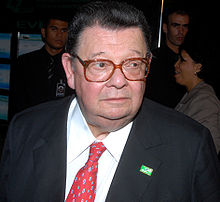Antônio Delfim Netto
Antônio Delfim Netto | |
|---|---|
 | |
| Federal Deputy for São Paulo[1] | |
| In office 1 February 1987 – 1 February 2007 | |
| Constituency | At-large |
| Minister of the Department of Planning of the Presidency[2] | |
| In office 15 August 1979 – 14 March 1985 | |
| President | João Figueiredo |
| Preceded by | Mário Henrique Simonsen |
| Succeeded by | João Sayad |
| Minister of Agriculture | |
| In office 15 March 1979[3] – 15 August 1979[4] | |
| President | João Figueiredo[3] |
| Preceded by | Alysson Paulinelli[3] |
| Succeeded by | Amaury Stabile[3] |
| Ambassador of Brazil to France[5] | |
| In office 7 February 1975 – 10 February 1978 | |
| President | Ernesto Geisel[3] |
| Preceded by | Aurélio de Lira Tavares |
| Succeeded by | Ramiro Saraiva Guerreiro |
| Minister of Finance[6] | |
| In office 17 March 1967 – 15 March 1974 | |
| President | Artur da Costa e Silva Emílio Garrastazu Médici |
| Preceded by | Eduardo Lopes Rodrigues |
| Succeeded by | Mário Henrique Simonsen |
| Personal details | |
| Born | 1 May 1928[7] São Paulo, São Paulo, Brazil[8] |
| Political party | [3] |
| Alma mater | School of Economics, Business and Accounting of the University of São Paulo |
| Field | Monetarism[9] Estruturalism[10] |
| School or tradition | Monetarism |
Antônio Delfim Netto (born May 1, 1928) is a Brazilian economist, former Minister of Finance, Agriculture, and Planning of Brazil, professor[3] and congressman. During his incumbency as Minister of Finance of Brazil, the country experienced the so-called Milagre Econômico (the Economic Miracle), a time of unprecedented economic growth.[3]
The Milagre Econômico overseen by Delfim Netto relied on a heterodox, developmentalist model.[11] The economic expansion relied on low wages, rapidly rising exports, and foreign capital inflows.[11] Delfim Netto originated the phrase "cake theory" in reference to this model: the cake had to grow before it could be distributed.[11] Although the "cake" in his metaphor did grow, it was highly unequally distributed.[11]
Bibliography[edit]
- Antônio Delfim Netto (1997). O Brasil pós-real: a política econômica em debate. Universidade Estadual de Campinas, Instituto de Economia. ISBN 978-85-86215-06-3.
References[edit]
- ^ "Brazilian House Website". Retrieved November 28, 2013.
- ^ "Brazilian Ministers of Planning Gallery". Retrieved November 28, 2013.
- ^ a b c d e f g h "O Ministério - nomes novos e antigos" [The Cabinet - new and former names]. O Estado de S. Paulo (in Portuguese). São Paulo: S.A. O Estado de S. Paulo. March 15, 1979. p. 14. Retrieved November 30, 2013.
- ^ "Banqueiros esperam definições mais claras" [Bankers await for clearer definitions]. O Estado de S. Paulo (in Portuguese). São Paulo: S.A. O Estado de S. Paulo. August 15, 1979. p. 29. Retrieved November 30, 2013.
- ^ "Brazilian Embassy on France Website" (in French). Retrieved November 30, 2013.
- ^ "Brazilian Ministers of Finance Gallery". Archived from the original on December 3, 2013. Retrieved November 28, 2013.
- ^ "Ministry of Finance of Brazil Website". Archived from the original on December 2, 2013. Retrieved November 26, 2013.
- ^ "USP website". Archived from the original on December 30, 2013. Retrieved November 26, 2013.
- ^ "Biography at UOL's website (in Portuguese)". Retrieved November 26, 2013.
- ^ Conversas com economistas brasileiros. São Paulo, Editora 34, 1996, p.129
- ^ a b c d Weber, Isabella (2021). How China escaped shock therapy : the market reform debate. Abingdon, Oxon: Routledge. p. 244. ISBN 978-0-429-49012-5. OCLC 1228187814.
- 1928 births
- Living people
- Brazilian economists
- University of São Paulo alumni
- Democratic Social Party politicians
- Reform Progressive Party politicians
- Progressistas politicians
- Brazilian Democratic Movement politicians
- Finance ministers of Brazil
- Government ministers of Brazil
- Members of the Chamber of Deputies (Brazil) from São Paulo
- Ambassadors of Brazil to France
- Agriculture ministers of Brazil
- Brazilian politician stubs
- Brazilian academic biography stubs
- South American economist stubs
- Brazil economy stubs
